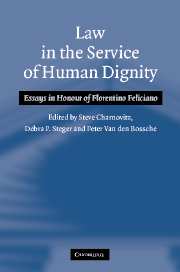Book contents
- Frontmatter
- Contents
- List of contributors
- Preface
- Biographical note
- List of abbreviations
- PART I Reflections on the contributions of Florentino Feliciano to international law
- PART II Insights into the World Trade Organization
- PART III The changing landscape of investment arbitration
- 17 The reshaping of the international law of foreign investment by concordant Bilateral Investment Treaties
- 18 ICSID arbitration and the state's increasingly remote consent: apropos the Maffezini case
- 19 The notion of investment in recent practice
- 20 Arbitration of investment disputes under UNCITRAL Rules and the choice of applicable law
- PART IV New challenges in international adjudication
- Bibliography of works by Florentino Feliciano
- Index
19 - The notion of investment in recent practice
from PART III - The changing landscape of investment arbitration
Published online by Cambridge University Press: 29 July 2009
- Frontmatter
- Contents
- List of contributors
- Preface
- Biographical note
- List of abbreviations
- PART I Reflections on the contributions of Florentino Feliciano to international law
- PART II Insights into the World Trade Organization
- PART III The changing landscape of investment arbitration
- 17 The reshaping of the international law of foreign investment by concordant Bilateral Investment Treaties
- 18 ICSID arbitration and the state's increasingly remote consent: apropos the Maffezini case
- 19 The notion of investment in recent practice
- 20 Arbitration of investment disputes under UNCITRAL Rules and the choice of applicable law
- PART IV New challenges in international adjudication
- Bibliography of works by Florentino Feliciano
- Index
Summary
Building bridges: a profile of Justice Feliciano
In several respects, Justice Feliciano's personality and career embody at the highest level what it may mean in our contemporary world ‘to live greatly in the law’. After the Marrakesh Agreement had successfully strengthened the rule of law in international trade law through the establishment of a formalized dispute settlement mechanism, Justice Feliciano was chosen to be one of the first members of the Appellate Body. This choice was far from self-evident, in as much as Justice Feliciano not only came from the developing world and had the confidence of colleagues and governments from the developing world, but moreover, had no special experience in matters of international trade law. And as the new WTO was a first step towards institution-building for a globalized economy, the experiment of introducing a global rule of law for the trade sector depended, to a large extent, on the success in the initial period of the new dispute settlement system charged with the application and interpretation of new and old rules. Today, ten years after Marrakesh, the WTO dispute settlement system is often considered the most successful effort in the globalizing world to establish the rule of law, all the problems in detail notwithstanding. From 1995 to 2001, Justice Feliciano was a member of the Appellate Body, serving as its Chair from 2000 to 2001.
Remarkably enough, Justice Feliciano's experience in international economic law is not limited to trade law.
- Type
- Chapter
- Information
- Law in the Service of Human DignityEssays in Honour of Florentino Feliciano, pp. 261 - 275Publisher: Cambridge University PressPrint publication year: 2005
- 2
- Cited by

